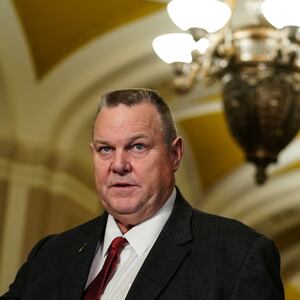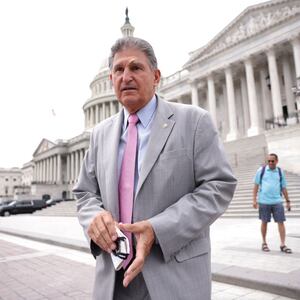After three Senate elections in which Democrat Jon Tester narrowly beat the Republican candidates by—collectively—40,000 votes, Montana Republicans are striking back.
The GOP-controlled state legislature is considering a radical change in election law—a change that is nakedly targeted at taking down Tester and could, in effect, flip one of the most vulnerable Senate seats well before November 2024.
Montana Republicans are trying to take a page out of California’s playbook and switch their primary election to the controversial top-two primary system, otherwise known as a “jungle primary.”
But it’s only for next year, when Tester, Montana’s last statewide Democrat, is up for re-election. After that, the change would expire, supposedly so lawmakers could assess how things went.
It’s a move that would obviously benefit the GOP—with suspiciously convenient timing. After the bill stalled in committee, the measure quickly sped through the state Senate, and now seems on the fast track toward becoming law.
Democrats, many flabbergasted by the ploy, are calling out the move.
“At a time when inflation and high costs are hurting Montana families, out-of-touch politicians in Helena are showing that they care more about power than addressing the real issues facing the state,” Tester’s campaign manager Shelbi Dantic told The Daily Beast.
“I’m hearing that folks around the state feel like it’s just dirty politics,” said state Sen. Shannon O’Brien (D-MT). “In Montana, we really do pride ourselves in looking beyond red and blue. This bill sure feels like strategy to target one race.”
“I continue to be astounded by it, to tell you the truth. It's just so brazen and shameless and an obvious effort to target one race, our next U.S. Senate race,” said state Sen. Pat Flowers (D-MT), minority leader in the Montana Senate.
“And for me, it just demonstrates that Republicans are scared of Jon Tester,” Flowers added.
There’s some truth to Flower’s latter point.
Republicans, hands down, would have preferred Tester not to run for re-election in 2024. He’s considered the only Montana Democrat prepared to actually compete for the Senate seat. And he’s managed to hang on through his past three elections, even as the state more broadly trended red.
But with a top-two primary, the math could sway in the GOP’s favor.
In a jungle primary, all candidates of both parties run in the same primary, and the top-two vote getters head to a runoff. That could mean that two Republicans simply beat Tester during the primary and only they go to the final vote during the general election. More likely—but potentially just as consequential—it could mean that Tester and a Republican go head-to-head during the general election, and third-party candidates, namely Libertarians, wouldn’t have a spot on the ballot.
In two of Tester’s previous three races, Republicans and Libertarians combined got more votes than Tester’s Democratic total. If there were no Libertarian option, the working assumption is Republicans would likely pick up those votes.
The bill’s sponsor, state Sen. Greg Hertz (R-MT)—who ignored multiple interview requests from The Daily Beast—has insisted in previous interviews that he’s not explicitly targeting Tester. Instead, he’s claimed he just wants to ensure the winner has to secure a majority of votes. A top-two system would do that.
“It always bothers me that sometimes our statewide elected officials don’t end up with the majority vote,” he said in committee last week.
As for the proposal expiring after Tester’s 2024 election, Hertz has been calling his bill a “test run,” a means for lawmakers to assess the results before deciding whether or not to keep it—or potentially expand it to other races. At least in public interviews, he’s done little to explain how lawmakers would measure the success of the jungle-primary system.
Tester announced his re-election campaign in February after months of questions on whether or not he’d run again. He’s long been open about the toll of traveling between Montana and D.C., particularly given the responsibilities of his family farm.
His decision came as Republican campaign operatives have been abundantly clear they intend to target his seat, with the GOP ravenously looking to take back the Senate majority in 2024. Tester is one of a handful of red or swing-state Democrats up for re-election, alongside Sen. Joe Manchin (D-WV) and Sherrod Brown (D-OH).
“They know Jon Tester is a proven leader with deep connections to Montanans, and are trying to change local election laws to look more like California’s in an attempt to gain political power for themselves,” Dantic said.
There have been no major announcements on the Republican side yet, though Reps. Matt Rosendale (R-MT) and Ryan Zinke (R-MT) are both considered likely contenders. Montana businessman Tim Sheehy’s name is also being floated.
The National Republican Senate Committee is coincidentally run this cycle by Montana Sen. Steve Daines (R). The interstate squabble has created a bit of an awkward dynamic that’s only sure to grow as time goes on.
But as for the top-two proposal, NRSC has been mum. A spokesperson Tuesday declined to comment on the bill or the campaign arm’s position on the matter.
The idea that a top-two primary would favor Republicans, though a logical theory, isn’t ironclad. A FiveThirtyEight analysis suggested there’s no guarantee Libertarians would sway Republican—or turn out to vote at all—if their chosen candidates aren’t on the ballot.
And in Tester’s last election in 2018, he did win the outright majority of votes. (Although 2018 was a banner year for Democrats all around; 2024 is likely to be different.)
The bill is also still moving through the state legislature—and would need to pass the state House before heading to the governor’s desk.
“I can never predict exactly what’s going to happen on the House side,” Flowers said.
“But clearly, there’s a lot of weight behind this proposal,” he said.









